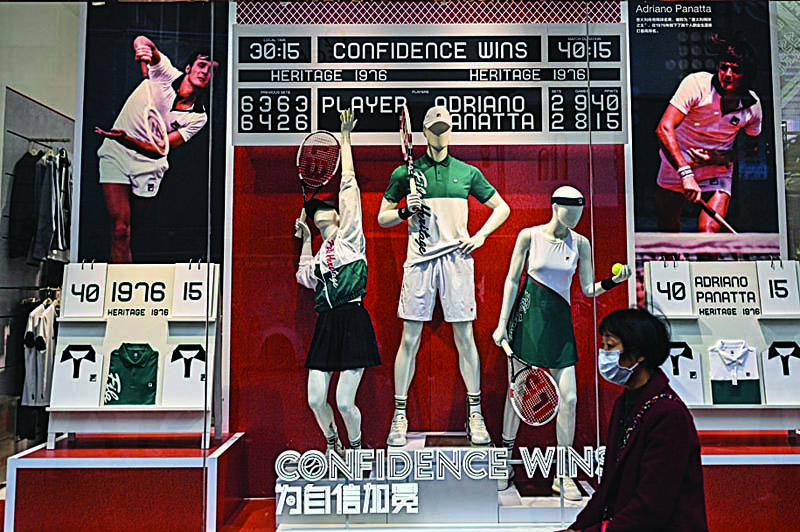 SHANGHAI: People walk past a shop for Italian sportswear company Fila in Shanghai. - AFP
SHANGHAI: People walk past a shop for Italian sportswear company Fila in Shanghai. - AFP
WASHINGTON: President Joe Biden's new trade negotiator has said the United States is not yet ready to lift tariffs on Chinese imports, but could be open to talks with Beijing. US Trade Representative Katherine Tai, whose appointment was confirmed earlier this month, told The Wall Street Journal she understood the levies were hitting some American companies and consumers, but they can also protect businesses.
In January 2020, then-president Donald Trump signed an accord between Beijing and Washington after a bruising trade battle that saw tariffs imposed by both sides. "I have heard people say, 'Please just take these tariffs off,'" the 47-year-old Tai told the WSJ in an interview published Sunday. But the former trade lawyer-whose parents were born in China-warned that suddenly axing the levies could harm the US economy unless a policy reversal is "communicated in a way so that the actors in the economy can make adjustments." She said it was essential for "companies, traders, manufacturers or their workers" to be able to plan for the future.
Tai told the Journal that while she recognized the tariffs were taking a toll on some US businesses, they had been imposed "to remedy an unbalanced and unfair trade situation." She also cited tactical reasons for holding firm. "No negotiator walks away from leverage, right?" she said. "Every good negotiator is going to keep all of their options open." Tai has already discussed Beijing's trade practices in calls with Japanese ministers, and in her confirmation hearings said she supported a "holistic review on China."
Australia treat
Meanwhile, Australia's trade minister threatened to take China to the World Trade Organization over its "unjustifiable" decision to hike duties on Australian wine imports for up to five years. In the latest salvo between Beijing and Canberra, China's commerce ministry announced levies ranging from 116.2 percent to 218.4 percent would be slapped on Australian wine imports from Sunday.
Trade Minister Dan Tehan said the tariffs meant it was "basically impossible" for Australian wine to be competitive in the Chinese market. "This decision which has been taken by the Chinese government is extremely disappointing and completely unjustifiable," Tehan told reporters in Melbourne.
"We will be looking at next steps, and those next steps will include looking at taking this matter to the World Trade Organization." On Friday, the Chinese commerce ministry said it was imposing the duties after an investigation found "dumping and subsidies on imported wines" from Australia impacted the Chinese market. Wine exports to China hit a record A$1.3 billion ($900 million) in 2019, according to Australian government data, making it the biggest market by value for the product.
Late last year, Australia also called for the WTO to investigate Chinese tariffs on barley imports, following a series of economic sanctions or disruptions to Australian products to China's vast market. Diplomatic relations between the two countries have reached their lowest since the deadly 1989 Tiananmen Square crackdown. Many see the sanctions as retribution for Australia blocking Chinese investment in sensitive areas and publicly calling for an investigation into the origins of the coronavirus.
Australian Prime Minister Scott Morrison, speaking in Sydney, accused Beijing of using the tariffs as "retaliation". Morrison also said Australia stood with British Prime Minister Boris Johnson after China imposed sanctions on several people in the UK and EU over their vocal support for the Uyghur Muslim minority in Xinjiang, where Beijing is accused of abuses. "So Boris-well done, mate-we stand with you and thank you for standing with Australia as well." - AFP




